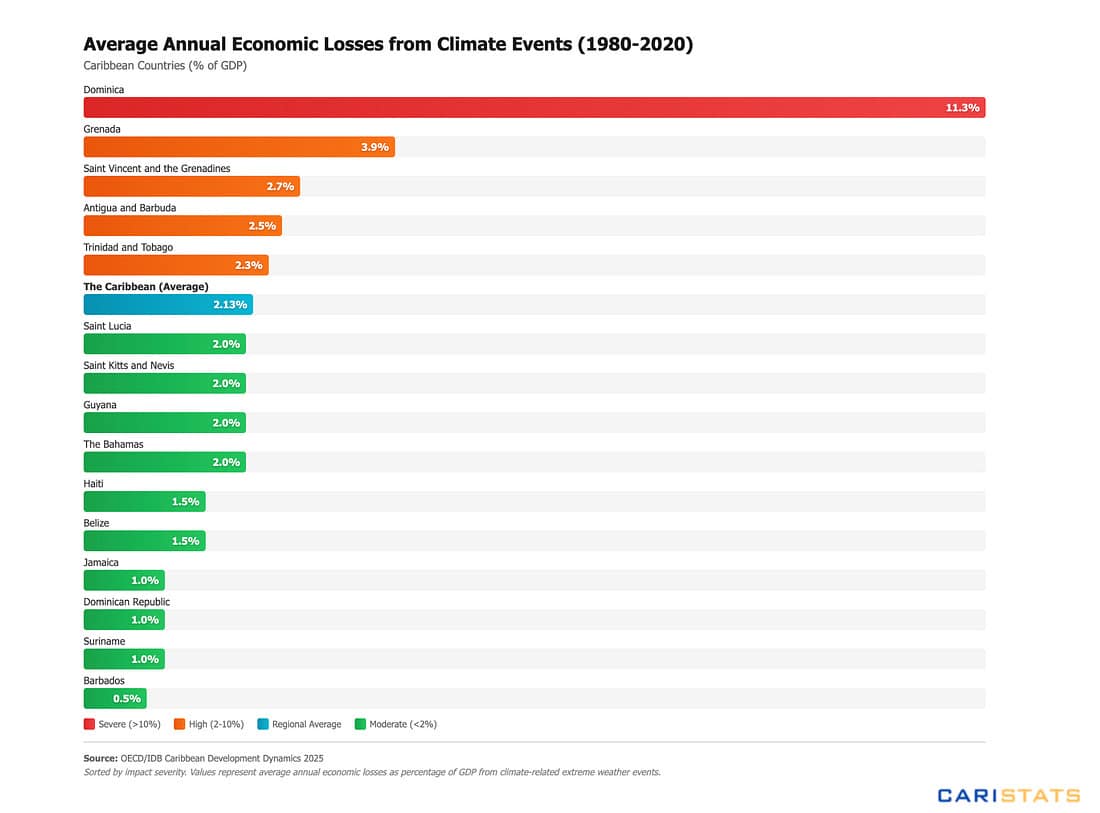
CLICK HERE TO JOIN OUR WHAT’S APP GROUP
Climate-related disasters inflict disproportionate economic damage on Caribbean nations, with annual losses averaging 2.13% of GDP from 1980-2020, according to recent OECD/IDB analysis.
This vulnerability was starkly illustrated by Hurricane Melissa, which struck Jamaica this week as a Category 5 storm with 185 mph winds – the strongest in the island’s history.
Government officials reported widespread devastation, flooding, and power outages affecting over 530,000 residents (CNN, October 29, 2025).
Dominica faces the highest burden at 11.3% of GDP annually, followed by Grenada (3.9%) and Saint Vincent and the Grenadines (2.7%).
Even countries with relatively lower exposure, like Barbados (0.5%), experience losses that would be considered catastrophic in developed nations. For context, the Caribbean contributes just 0.23% of global greenhouse gas emissions.
The frequency of extreme weather events has surged 85% between 2001-2020 compared to 1980-2000, with 322 climate disasters affecting 24 million people over the four-decade period.
Haiti, Dominican Republic, and Jamaica alone accounted for 60% of regional climate hazard events.

Despite these challenges, Caribbean nations are pioneering innovative climate finance solutions, including hurricane clauses, blue bonds, and debt-for-nature swaps, that could serve as models for other climate-vulnerable regions, while building resilience for future generations.
Source: OECD/IDB Caribbean Development Dynamics 2025
CLICK HERE TO JOIN OUR WHAT’S APP GROUP
CLICK HERE TO JOIN OUR WHAT’S APP GROUP
CLICK HERE TO JOIN OUR WHAT’S APP GROUP
CLICK HERE TO JOIN OUR WHAT’S APP GROUP
CLICK HERE TO JOIN OUR WHAT’S APP GROUP
CLICK HERE TO JOIN OUR WHAT’S APP GROUP
CLICK HERE TO JOIN OUR WHAT’S APP GROUP
CLICK HERE TO JOIN OUR WHAT’S APP GROUP
CLICK HERE TO JOIN OUR WHAT’S APP GROUP
CLICK HERE TO JOIN OUR WHAT’S APP GROUP
CLICK HERE TO JOIN OUR WHAT’S APP GROUP
CLICK HERE TO JOIN OUR WHAT’S APP GROUP
CLICK HERE TO JOIN OUR WHAT’S APP GROUP
CLICK HERE TO JOIN OUR WHAT’S APP GROUP
CLICK HERE TO JOIN OUR WHAT’S APP GROUP
Advertise with the mоѕt vіѕіtеd nеwѕ ѕіtе іn Antigua!
We offer fully customizable and flexible digital marketing packages.
Contact us at [email protected]
















And our prime minister Gaston is still destroying mangrove and swamp in Barbuda to please white elites playing golf and build their homes in a bird sanctuary or national park once their pockets are ostensibly filled
Comments are closed.